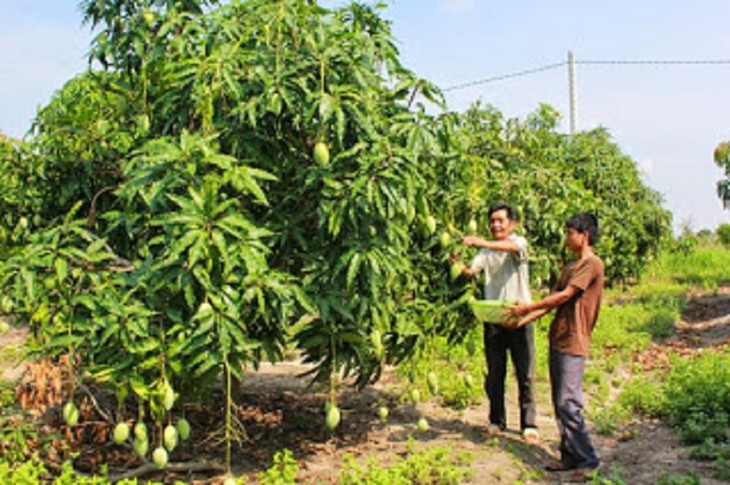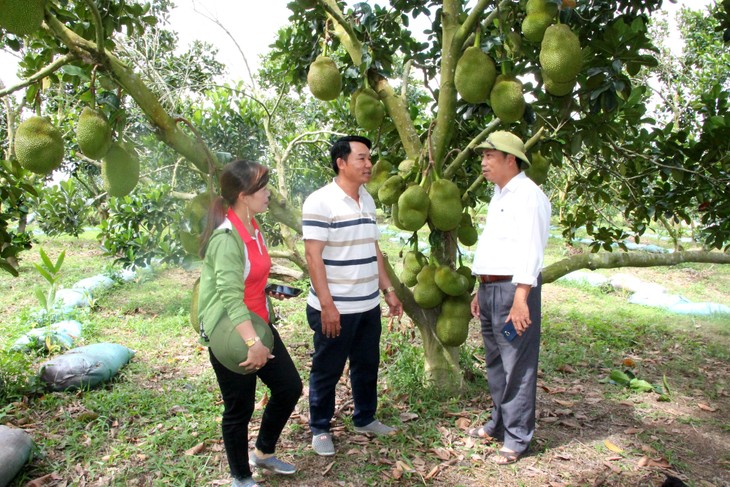(VOVWORLD) - The resolution of the Party Committee of Lak district in Dak Lak province on crop and livestock restructuring until 2025 has over the past year opened a path to sustainable poverty reduction for ethnic people in an extremely disadvantaged area. VOV reports on how ethnic people in Lak district have escaped poverty.
 The mango garden of Nguyen My Binh’s family in Dak Lak province (Photo: easup.daklak.gov.vn) The mango garden of Nguyen My Binh’s family in Dak Lak province (Photo: easup.daklak.gov.vn) |
The highlight of the Resolution is to involve the whole political system from the grassroots level, with Party members as the vanguard, with a sense of responsibility for the people.
To spare the budget, Lak district has called for contributions from officials and Party members. At the same time, agencies and businesses which are twinned with ethnic-inhabited hamlets have donated hundreds of thousands of tree seedlings to the poor and provided instruction in farming techniques.
As a result, in the first year of the resolution’s implementation, Lak district made a strong breakthrough in crop conversion and afforestation.
Dơ Tu hamlet’s bare gardens, exhausted soil, and uncultivated hills have been recovered with green since every household received instruction in how to grow and care for the donated trees.
Y Jony Bya, a Do Tu villager, is excited because he intercropped dozens of jackfruit trees before the rainy season and now they are growing well on the family’s 1,500 square-meter plot.
“We’d like to thank the district and commune administration for giving us fruit seedlings to restructure our crops using the intercrop mode. My family will do our best to take care of the fruit trees and escape poverty,” said Y Jony Bya.
Y Gham Triet of Phok hamlet told VOV that, thanks to the district’s instruction, his jackfruit trees are growing well.
Triet says he was aware of the need to convert crops properly. He plans to plant all his unused land with jackfruit trees before the coming rainy season.
“We’ve received seedlings and want to thank the State for its support. Thanks to a good harvest from the fruit trees, we’ve had more income,” according to Triet.
Nguyen Van Huyen, Secretary of Yang Tao commune’s Party Committee, said that more than 7,000 fruit trees, including jackfruit, coconut, and mangosteen, have been given to 1,500 poor households.
 The jackfruit farm of Nguyen Dinh Thin’s family in Dak Lak (Photo: danviet.vn) The jackfruit farm of Nguyen Dinh Thin’s family in Dak Lak (Photo: danviet.vn) |
The commune has set up 22 jackfruit tree models in 11 hamlets, and has mobilized sister businesses and benefactors to donate more seedlings.
Huyen explained, “We surveyed all the impoverished land in the commune, which villagers had rarely improved, and asked them, first, to prepare for crop restructuring in accordance with the Party’s Resolution. After explaining the Resolution, we called on organizations, businesses, individuals, and Party members to make contributions. We’ve mobilized about 440 USD in the commune to buy jackfruit seedlings. Jackfruit is a multi-purpose tree. One purpose is to reduce local poverty in the coming months.”
Poor households account for 27% of the total households in Lak district, the second highest rate in Dak Lak province. Over the years, a majority of ethnic households have left their land fallow, making it difficult to escape poverty.
Vo Ngoc Tuyen, Secretary of Lak district’s Party Committee said that after nearly a year of implementing the Resolution, more than 100,000 fruit trees worth 88,000 USD have been donated. 10,000 poor households have received seedlings, enough to cover 200 hectares of bare land.
“The Resolution has had a great effect. Lak district has spared its budget by mobilizing sister companies and agencies to donate trees to their sister hamlets. Since early March, more than 100,000 seedlings of all kinds have been planted,” said Tuyen.
The Resolution of Lak district’s Party Committee on crop and domestic animal conversion has changed people’s way of thinking and steered production toward sustainable poverty reduction.